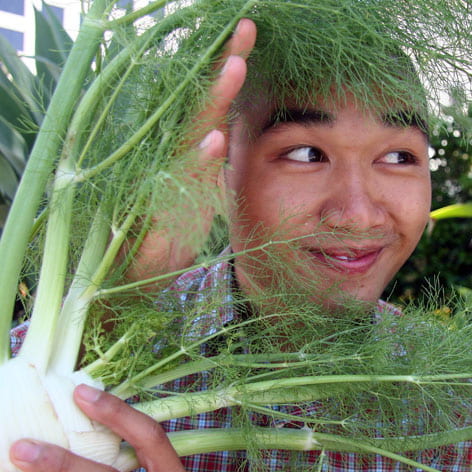Conscientious ‘Eater
Hai Vo ’09 sows seeds of sustainable food reform at UC Irvine and beyond.

Taste the first sweet peach of the season; find the beauty in the bumpy skin of a tangelo. Take a trip to the Irvine farmers market with social ecology graduate Hai Vo, and his love of food becomes contagious. He’s on a first-name basis with many of the vendors, often trading tips and jokes. It wasn’t always this way.
Just three years ago, Vo’s now-wiry frame tipped the scales at 250 pounds. But instead of making food the enemy, Vo has made it his passion. He became a student leader of the Real Food Challenge at UCI, joining a nationwide, student-based network that advocates “real” food: ecologically sound, community-based, humane and fair. More than 300 universities are rising to the challenge; the group at UCI has seven active leaders and 50 members.
Food is personal for Vo. “There’s nothing more intimate than the relationship between humans and food,” he says. The son of Vietnamese refugees, Vo says his parents’ stories all center around food — whether it was the couple starving on a boat with only a few grains of rice or his mother and grandmother cooking for a week and then making a perilous three-day trek to deliver the fare to Vo’s imprisoned grandfather. “Food,” he says, “became the glue for our family.”
Vo grew up in Westminster. As a low-income student in the public school system, he got free lunches — but at a high price. The processed meals of chicken nuggets and syrupy fruit changed his palate preferences. Peers had a large influence too. “I loved soda, candy, anything greasy and salty,” he says.
It wasn’t until he came to UCI that Vo started to cook for himself, focusing on healthy food. He had transferred from Orange Coast College after a career counselor recommended UCI’s social ecology program. “I read the catalog and wanted to take every single course,” recalls Vo.
“I love social ecology’s emphasis on interdisciplinary community problem-solving,” he says. Vo began studying food’s journey from the field to the fork. Soon, his personal health battle turned into a public effort. An activist was born.
Last fall, Vo and Kelsey Meagher, cognitive sciences undergraduate and Real Food Challenge president, began an assessment of campus dining services. The early results revealed that 10 percent of it is “real” — not bad, considering the national average is 2 percent. But the Real Food Challenge’s target is 20 percent “real” food by 2020. And Vo is busy trying to reach it.
His passion for sustainable food is spreading beyond the Irvine campus — all the way to the UC Office of the President, where Real Food Challenge goals are being considered for systemwide implementation. “It’s a really exciting time right now,” Vo says, beaming.
“I am truly impressed by the impact the Real Food Challenge has had on the campus and surrounding community this past year,” says Wendell Brase, administrative & business services vice chancellor. “It’s an inspiration to other campuses looking to successfully implement behavioral change — which is often the most challenging part of a campus’s strategy to reduce its impact on the environment.”
Vo is reaping the rewards of his labor. He graduated summa cum laude and received awards for outstanding contributions to social ecology and excellence in field study. He’ll present his research at the 8th Annual UC, CSU, CCC Sustainability Conference at UC Santa Barbara June 21-24.
Vo now plans to immerse himself in urban farming, seeking innovative ways to grow food within a city setting. He got a taste of farming last summer as an intern at UC Davis. “It changed my senses,” Vo says. He returned to UCI with fresh eyes, quickly identifying fruit trees and edible plants around campus and urging administrators to extend sustainability efforts to university grounds.
He has even taught his teachers. Joseph DiMento, planning, policy & design professor and one of Vo’s advisers, says: “Hai and his colleagues convinced me — a person who lives for food — that there is not only good food but ‘real’ food. What he and the movement he represents are doing can revolutionize not only what we eat but the way we think about our obligations to each other and to the environment.”